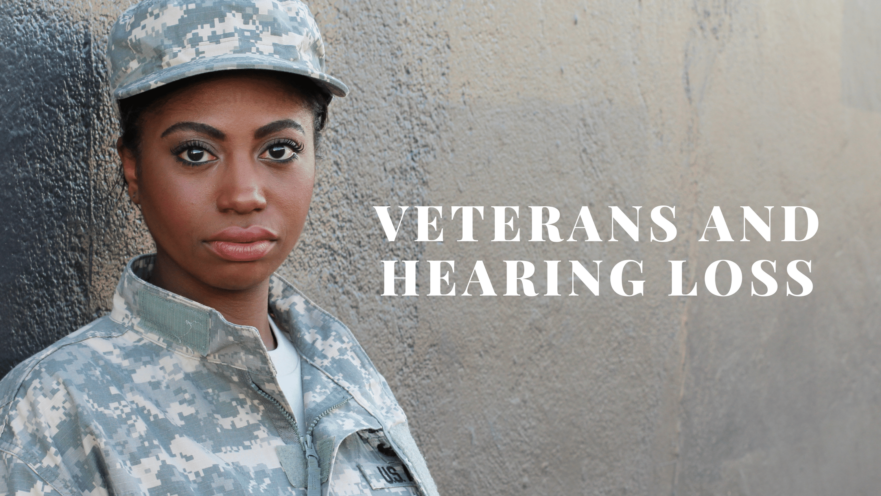Veterans experience an increased risk of developing hearing loss. In fact, impaired hearing is one of the most common chronic health conditions that veterans navigate. Hearing loss and tinnitus – a buzzing or ringing like noise in the ears – disproportionately impact veterans as a result of exposure to loud noise and injury. According to the Centers for Disease Control and Prevention (CDC), veterans are 30% more likely to develop hearing loss than nonveterans. Additionally, 3 million veterans received disability compensation for hearing healthcare specific to tinnitus and/or hearing loss management in 2017. Hearing loss reduces a person’s ability to absorb and process sound which has multifaceted effects that can take a toll on everyday life. It is important to prioritize hearing health by understanding how to intervene and address hearing challenges.
Noise Induced Hearing Loss
One of the most common causes of hearing loss is exposure to loud noise. One time or consistent absorption of loud noise can damage critical components of the auditory system which enables us to process and understand sound. This includes the hair cells in the inner ear which helps translate soundwaves into electrical signals that are then sent to the brain. Loud noise can cause these hair cells to lose sensitivity and/or die which prevents them from supporting the brain with processing incoming sound. There are thousands of hair cells in the inner ear and these cells, unlike other types, do not regenerate. This means that any damage is permanent, resulting in hearing loss.
Veterans are particularly vulnerable because of regular exposure to hazardous noise in the workplace. This can include:
- Aircraft like helicopters, fighter jets, transportation planes
- Weapons including: shotguns, rifles, grenades, bombs
- Armored vehicles, tanks, working in noisy engine rooms
- Operating heavy, and loud equipment
These sources of noise are considered dangerous for hearing health. Sound that exceeds 85 decibels is potentially harmful to hearing. This is the equivalent of busy city traffic, blow dryer, or blender. Veterans are exposed to noise well above 85dB which significantly increases their risk of developing hearing loss.
Identifying Hearing Loss Symptoms
It is important to identify changes to your hearing health and seek treatment to address symptoms which can include the following:
- Tinnitus is one of the most common symptoms
- Increasing the volume on electronic devices (TV, phone, speaker etc.)
- Sound is muffled or slurred making it hard to distinguish words
- Frequently asking others to speak louder, slower, and/or repeat themselves
- Difficulty hearing in environments with background noise
- Feeling confused, fatigue, and/or anxious during a conversation
- Needing to move to a quieter area to hear better
- Being able to hear more clearly in one ear over the other
These symptoms can be experienced mildly to profoundly which can make it challenging to perform even the simplest everyday tasks. Strained communication can also impact relationships, job performance, social engagement, and mental health. It is incredibly important to have hearing evaluated, even if you do not recognize any symptoms. Preventive care is just as important, especially for veterans.
Understanding the VA & Hearing Loss Benefits
Learning about the benefits that you are eligible for can be really useful while seeking hearing healthcare. The U.S. Department of Veterans Affairs (VA) offers two main services for veterans who have hearing loss and/or tinnitus:
- VA Health Benefits: this includes free or low-cost hearing health care. This includes testing for hearing loss, and potentially hearing aids.
- VA Disability Benefits: monthly compensation
Veterans are required to enroll in the VA Health Benefits which you can do by contacting your local VA office. After being approved, you are able to have your hearing assessed by an audiologist who is a licensed healthcare professional that specializes in hearing health.
Treating Hearing Loss
After establishing any benefits that you qualify for, the next step is to schedule an appointment with an audiologist for a hearing test. Hearing tests involve a noninvasive, painless, and relatively quick process that measures your hearing capacity in both ears. This identifies any impairment, and the degree of hearing loss you may be experiencing.
Hearing loss is most commonly treated with hearing aids, electronic devices that absorb and process sound. This provides significant support, increasing hearing ability across all environments. Treating hearing loss can transform hearing and overall health and wellness!
We salute the brave servicemen and women who have given so much. If you are a veteran seeking hearing health services, we’re here to help. Contact us today for a consultation.

